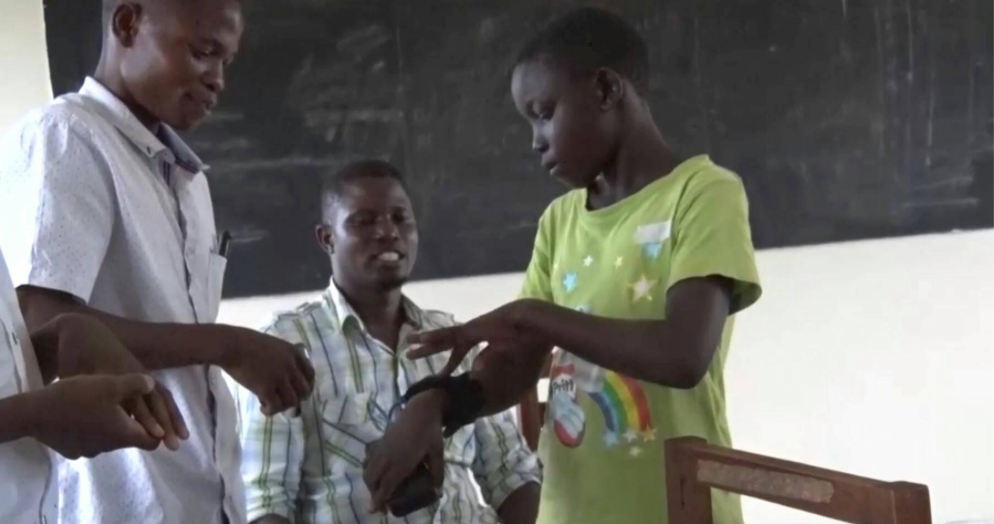

Magdalen alumni have used their technological skill to not only develop successful concepts, but also to solve real-world problems. On this page, you can read about the projects of two recent alumni, Adrian Kozhevnikov (2017, Engineering) and Beth Plant (2017, Human Sciences).

Adrian Kozhevnikov (2017, Engineering) had wanted to develop a startup since he was at school. After an older student at his school sold a successful app to Yahoo, he became specifically interested in tech start-ups, teaching himself the programming language for iPhone apps.
This initial background knowledge helped him to get involved in a team developing a taxi comparison app called Caleche at a very young age. The app compared up and coming taxi services to give either the closest or cheapest car for a user. This project helped him to win the Techstars Global Startup Battle 2015, and set him up for a series of future ventures.
Oxford Projects:
After arriving at Magdalen in 2017, Adrian’s next venture came in the form of OX1 incubator. This scheme is a student-run not-for-profit startup incubator that aids student entrepreneurs. Last year, he helped to organise workshops from 11 successful entrepreneurs. These included several Magdalen alumni and Matt Clifford, the co-founder and CEO of Entrepreneur First.
One of his most recent projects has been part of the StEP program run by Oxford University Innovation. As part of this program, Adrian was given a license to create a business out of Oxford Intellectual Property. He explains the product his team worked on below:
We worked on a pan which heated up 44% faster and needed 44% less energy to maintain the same heat specifically on gas stoves, which was created by engineering professor Thomas Povey…We looked to either take it into the economically developing world to tackle the problem of clean cooking or to take it into higher end stores.
This project taught him the difficulties that can be faced in the entrepreneurial process. Firstly, the complex shape of the pan means it is a very expensive pan to manufacture for the developing world. Secondly, the gas cooking market is decreasing in the developed world so it is difficult to break into the market without a big brand supporting the project. Despite these difficulties, there is a smaller team that is still working on selling these pans to NGOs, ensuring that the project has longevity.
Although still young, Adrian has used the knowledge gained through his previous ventures in his future project. He is currently a co-founder at Cibus Health. This company, which recently won the Oxford University Innovation Incubator Day, is an infant communications company whose mission is to become the recognised leader in infant wellness.
He described its mission as the following:
We want to give babies the best start to life, and our first project is based around infant feeding and obesity. We use continuous monitoring of a proprietary combination of physiological biomarkers to allow parents and caregivers to visualise and better understand the feeding process. The novelty behind the solutions we develop is that they provide non-invasive, real-time, and personalised feedback about physiological conditions through technologies that users are already familiar with.
Adrian has worked on several different ventures throughout his time at Oxford, and will use the experience gained from all of them when working on Cibus Health into the future.
Over the lockdown, he has also founded another venture – Fundder, along with another Magdalen Student – Sarthak Jain, and 2 other cofounders. Fundder’s mission is to make charity and general fundraising as simple and social as possible, as it is built in a familiar structure to other social networks, thus encouraging more entertaining and quicker posts rather than the standard fundraising activities such as running. They have already had people eat a lemon for the first time, busk, and race the London Underground among many other things. The idea came during lockdown, as the team saw more and more people attempt challenges on social media platforms, and thought about how to harness it for charity.
More information can be found at fundder.co.
Adrian continues working on both Fundder and Cibus Health currently, alongside his degree.

In the Long Vac of 2018, Beth Plant (2017, Human Sciences) undertook an internship in Kampala in Uganda where she spent three months consulting on Ugandan run social enterprises and learning how to run a start-up. Whilst there, she met three Ugandan nationals with engineering backgrounds who were passionate about ending gender-based violence in Uganda.
By the end of her internship, Beth had founded SAFEBANGLE, an affordable and innovative rape alarm which was also designed to be fashionable. A year on, SAFEBANGLE has been funded by UN Women and partnered with Save the Children. This is her story.
There are many stories of murder, rape and kidnapping of women in Uganda, but the cases are often dismissed due to lack of evidence or timely reporting. During initial research into this problem, what struck Beth was not only the horrors that women face but also how the fear of such attacks changes the way women go about their day to day lives.
Makerere University is one of the top higher education institutions in East Africa and many classes are run in evenings to allow students to support themselves with jobs during the day. However, 80% of the female students interviewed admitted they were scared to walk alone through campus at night and would miss classes out of fear. Not only will 56% of these women face gender-based assault, but the fear of these attacks also takes away autonomy, educational opportunities, and mental well-being.
“Once we knew this was a problem we wanted to work on,” says Beth, “we started research into the root causes of the problem and NGOs currently working on gender-based violence in Uganda to see if there was a niche we could fill.” The main issues that need to be addressed to end gender-based violence are culture and gender equality, but this is a slow process with many large and established NGOs working on it, for example, Raising Voices, Save the Children, and CEDOVIP. As a start-up, Beth and SAFEBANGLE believed that this was not an area where their skills would be useful. Instead, they looked at would could help women at the point of attack.
Taking inspiration from rape alarms used in Europe and North America, SAFEBANGLE designed a fashionable bracelet which when pressed creates a loud alarm. It also contains a GPS and sim card which messages 6 pre-programmed emergency contacts. Other rape-alarms on the market are incredibly expensive, many with the same capabilities cost around $200, which would not be affordable even to Uganda’s middle and upper classes. As SAFEBANGLE is a non-profit and using local manufacturers, it is hoped the product will be sold for a maximum of $10 to larger charities and institutions, which can then give them to beneficiaries for free.
In Trinity Term 2019, Beth was awarded the Vice-Chancellor’s Social Impact Award in the category of social enterprise. The awards celebrate Oxford University students who have made a difference in our local or global community in three categories; volunteering, campaigning and social enterprise. Beth says:
It was an honour to be awarded this for my work with SafeBangle It is more than just a personal achievement, but a reflection of the hard work of the whole team in Uganda and an encouragement to keep working to stop gender-based attacks.
Beth’s internship was with United Social Ventures, an incubator for Ugandan social enterprises. She says, “I found out about it through United Social Ventures OxMak, which is a student-run society (and spin-off of the Ugandan company), that I was president of in my second year. It pairs Oxford students with students at Makerere University in Kempala to skype about their business ideas and help look over and proofread business plans or grant applications. They run an internship every year in Uganda which is advertised by the society but open to anyone to apply.”
Beth hopes to work in social enterprise or international development long-term with a particular interest in Sub-Saharan Africa. However, she plans to reduce her role in SAFEBANGLE when they have a stable manufacturing and sales process, leaving the company in the hands of her Ugandan colleagues.